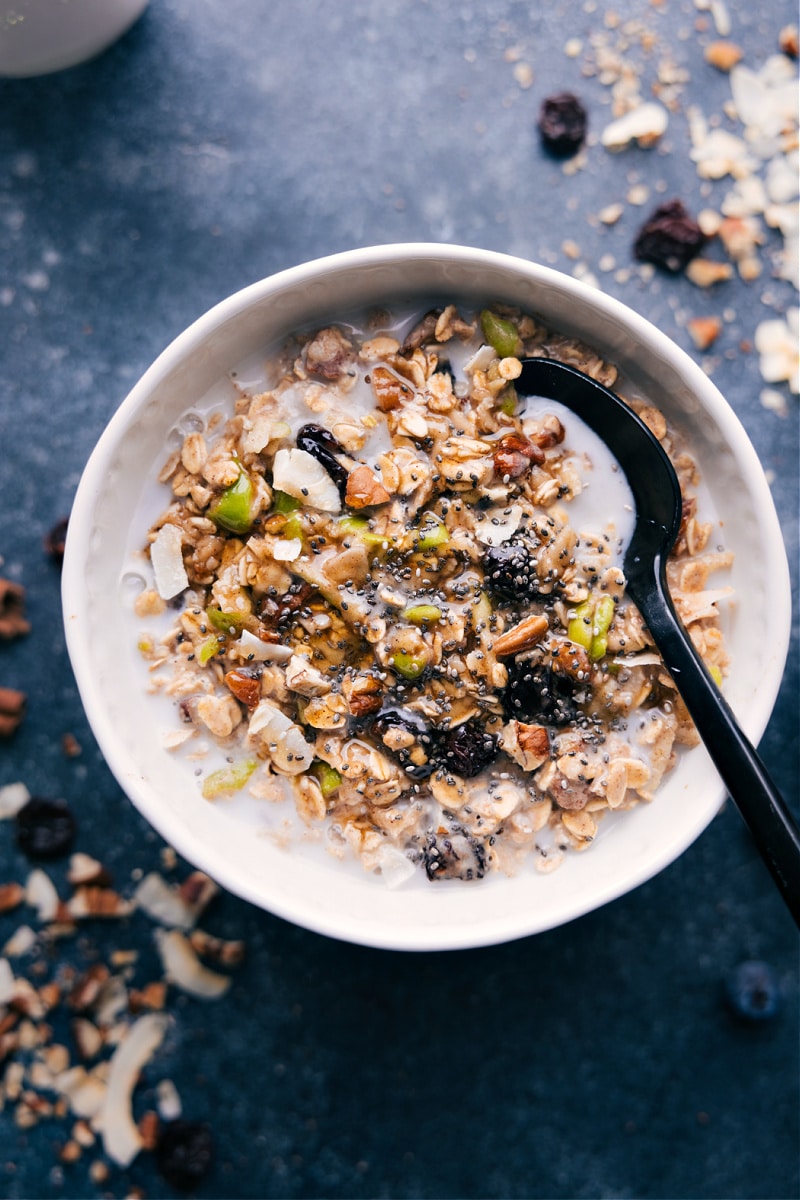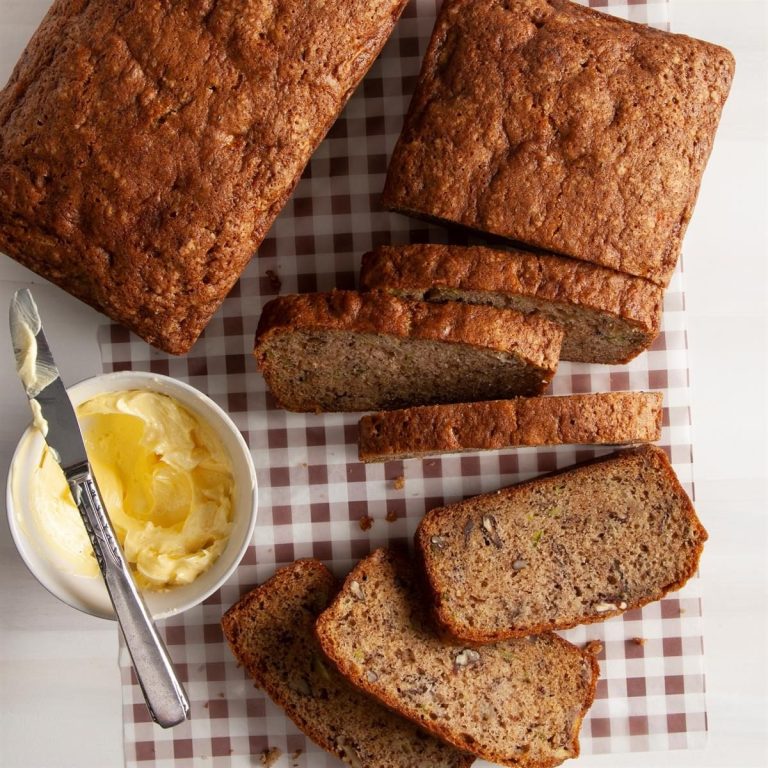Muesli: Origins, Benefits, and Delicious Recipes Explained
Muesli is a wholesome breakfast mix. It’s typically composed of rolled oats, nuts, seeds, and dried fruits. You can eat it cold, with milk, yogurt, juice, or plant-based alternatives. You can also enjoy muesli hot by soaking it in milk or water and heating it. It’s known for its versatility and nutritional value, making it a popular choice for health-conscious individuals.
Historical Background
Muesli originated in the early 1900s. Swiss physician Dr. Maximilian Bircher-Brenner created it for patients in his hospital. He believed that a diet rich in raw foods could significantly improve health. Initially, muesli was a simple blend of oats soaked with lemon juice and water, mixed with yogurt and fresh fruit. Over time, this nutritious blend evolved, incorporating various nuts, seeds, and dried fruits.
Muesli gained popularity beyond Switzerland in the late 20th century. As health-conscious eating gained traction, this versatile breakfast option found its way into kitchens worldwide. Today, people appreciate muesli for its customizable nature, nutritious ingredients, and ease of preparation.
Key Ingredients in Muesli
Common Grains and Nuts
Muesli typically starts with a base of whole grains, which offer numerous health benefits. Oats, barley, and wheat flakes are commonly used grains. Whole grains are rich in fiber, vitamins, and minerals, contributing to digestive health and sustained energy levels.
Nuts add both flavor and a nutritional boost. Commonly used nuts include almonds, walnuts, and hazelnuts. They provide healthy fats, protein, and antioxidants. Including a variety of nuts enhances the texture and taste while offering different health benefits.
Dried Fruits and Sweeteners
Dried fruits are essential in muesli for their natural sweetness and nutrient content. Popular choices are raisins, dates, apricots, and figs. These fruits are high in vitamins, minerals, and fiber, which aid in digestion and provide a quick energy source.
For additional sweetness, some prefer adding natural sweeteners. Honey, maple syrup, or agave nectar are commonly used. These options add sweetness without compromising the health benefits of muesli. Including various dried fruits and sweeteners allows for a balanced mix of flavors and nutrients.
Nutritional Benefits of Muesli
Macronutrient Breakdown
Muesli offers a balanced macronutrient profile, providing essential carbohydrates, proteins, and fats. Whole grains such as oats deliver complex carbohydrates, which supply sustained energy. Nuts and seeds in muesli contribute healthy fats, aiding in satiety and supporting heart health. Adding milk or yogurt boosts protein content, which is crucial for muscle repair and growth.
Vitamins and Minerals
Muesli is rich in various vitamins and minerals essential for overall health. It includes B vitamins from whole grains, which support metabolism and energy production. Nuts like almonds supply Vitamin E, an antioxidant that protects cells from damage. Dried fruits in muesli provide potassium, essential for maintaining proper muscle function and fluid balance. Additionally, seeds like flaxseeds add Omega-3 fatty acids, which are beneficial for brain health.
How to Enjoy Muesli
Classic Muesli Preparation
To prepare classic muesli, you need simple ingredients. Combine rolled oats, nuts (like almonds or walnuts), dried fruits (such as raisins or apricots), and a hint of sweetener (honey or maple syrup). Use roughly 1 cup of oats, 1/4 cup of nuts, and 1/4 cup of dried fruits. Pour these into a bowl and mix well. Add your preferred liquid; options include milk, yogurt, or a plant-based alternative like almond milk. Let it soak for at least 10 minutes, or overnight if you want it softer. Serve chilled or at room temperature.
Creative Muesli Recipes
Give muesli an exciting twist by experimenting with different recipes. For a tropical blend, mix rolled oats with dried mango, shredded coconut, and macadamia nuts. Add coconut milk for a rich flavor. For a chocolate version, combine oats with cocoa powder, chocolate chips, and hazelnuts. Use soy or regular milk and top with fresh berries. Alternatively, create a warm muesli by using steel-cut oats, adding cinnamon, nutmeg, and cooking in apple cider. Add fresh apple slices and pecans after cooking for crunch.
These innovative recipes provide versatility and flavor, enhancing your muesli experience.
Muesli vs. Other Breakfast Foods
Muesli and Granola
Muesli and granola, both popular breakfast choices, offer distinct nutritional profiles. Muesli usually contains uncooked rolled oats, nuts, seeds, and dried fruits. The ingredients remain raw or lightly toasted. This preparation method retains more natural nutrients, resulting in a lower-calorie option without added sugars.
Granola, on the other hand, involves toasting oats with oil and sweeteners like honey or syrup, adding crunch and sweetness. It often contains additional ingredients such as puffed rice, chocolate chips, or sweetened dried fruit. These additions increase the calorie count and sugar content, making it denser in energy compared to muesli.
Comparing Muesli to Traditional Cereals
Traditional cereals, often marketed to children, contain refined grains and significant amounts of added sugars. These cereals offer quick energy due to their high glycemic index but lack the sustained energy release provided by muesli’s whole grains.
Muesli provides a balanced nutrient profile. It offers complex carbohydrates, protein from nuts and seeds, and healthy fats. Essential vitamins and minerals like B vitamins and omega-3 fatty acids are often present, contributing to overall wellness.
When comparing fiber content, muesli typically exceeds traditional cereals due to its whole grain and nut-based composition. This fiber aids digestion and promotes satiety, making muesli a more filling and healthier breakfast choice.
Muesli and Oatmeal
Oatmeal, similar to muesli, consists of oats as the primary ingredient. It usually involves cooking oats in water or milk. While both provide high fiber and complex carbs, muesli includes a diverse mix of ingredients, enhancing its nutritional profile.
Muesli offers a more varied texture and flavor compared to the simpler oatmeal, appealing to those seeking a more multifaceted breakfast option.
Conclusion
Choosing muesli as part of your diet can significantly boost your nutritional intake. Its combination of whole grains, nuts, seeds, and dried fruits provides a balanced, nutrient-rich option that’s versatile and easy to prepare. Whether you prefer it with yogurt, milk, or even as an overnight soak, muesli adapts to your taste and lifestyle.
Its comparison to other breakfast options like granola, traditional cereals, and oatmeal highlights its superior nutritional profile. With lower sugar content and higher fiber, muesli supports digestive health and keeps you fuller longer. Embrace muesli as a wholesome breakfast choice that not only fuels your day but also supports your overall well-being.






